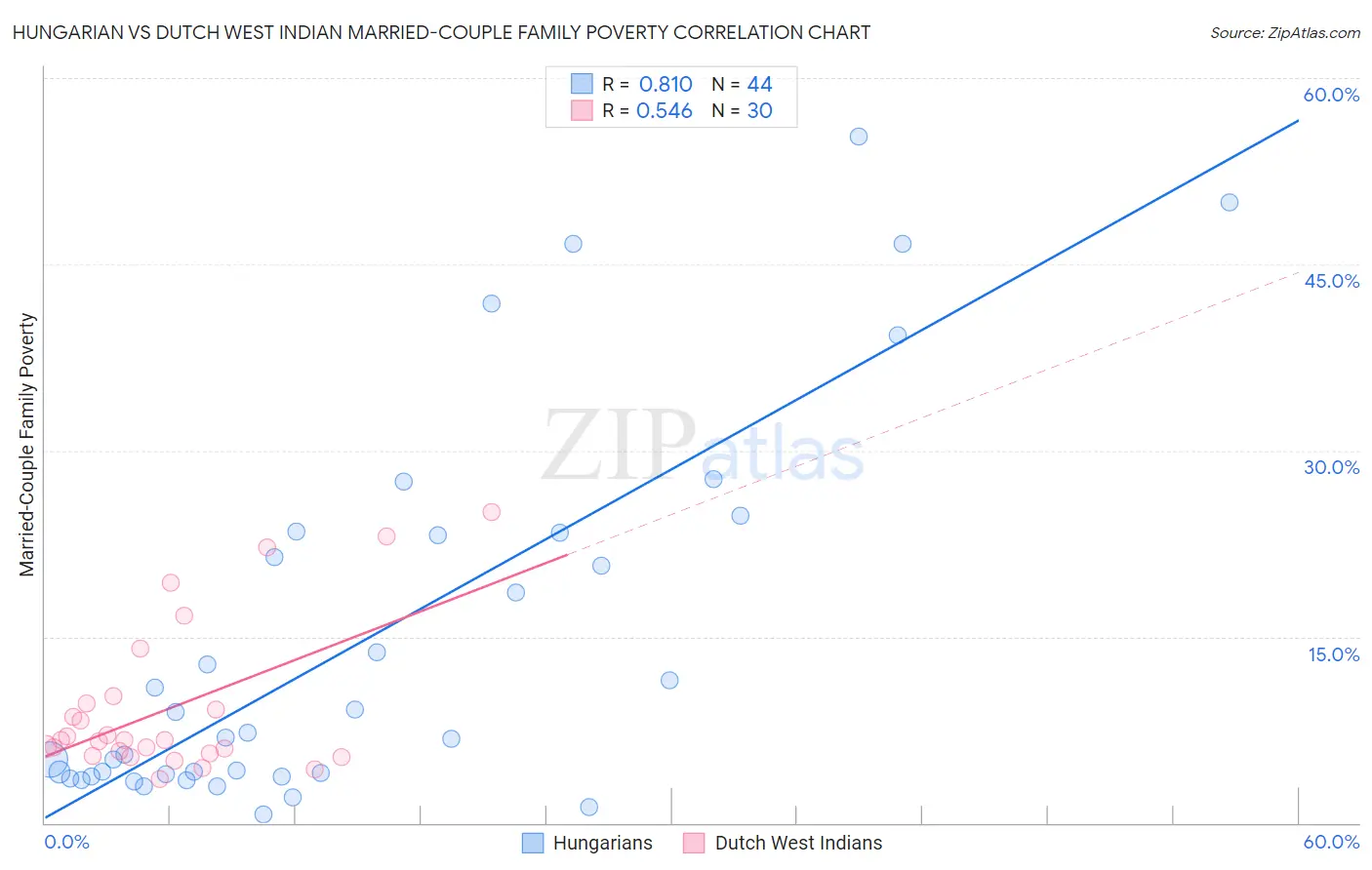Hungarian vs Dutch West Indian Married-Couple Family Poverty
COMPARE
Hungarian
Dutch West Indian
Married-Couple Family Poverty
Married-Couple Family Poverty Comparison
Hungarians
Dutch West Indians
5.3%
MARRIED-COUPLE FAMILY POVERTY
34.7/ 100
METRIC RATING
186th/ 347
METRIC RANK
6.4%
MARRIED-COUPLE FAMILY POVERTY
0.0/ 100
METRIC RATING
284th/ 347
METRIC RANK
Hungarian vs Dutch West Indian Married-Couple Family Poverty Correlation Chart
The statistical analysis conducted on geographies consisting of 478,217,673 people shows a very strong positive correlation between the proportion of Hungarians and poverty level among married-couple families in the United States with a correlation coefficient (R) of 0.810 and weighted average of 5.3%. Similarly, the statistical analysis conducted on geographies consisting of 85,614,682 people shows a substantial positive correlation between the proportion of Dutch West Indians and poverty level among married-couple families in the United States with a correlation coefficient (R) of 0.546 and weighted average of 6.4%, a difference of 21.3%.

Married-Couple Family Poverty Correlation Summary
| Measurement | Hungarian | Dutch West Indian |
| Minimum | 0.71% | 3.6% |
| Maximum | 55.3% | 25.0% |
| Range | 54.5% | 21.4% |
| Mean | 14.8% | 9.2% |
| Median | 7.0% | 6.7% |
| Interquartile 25% (IQ1) | 3.9% | 5.6% |
| Interquartile 75% (IQ3) | 23.3% | 9.6% |
| Interquartile Range (IQR) | 19.4% | 4.0% |
| Standard Deviation (Sample) | 15.1% | 6.0% |
| Standard Deviation (Population) | 14.9% | 5.9% |
Similar Demographics by Married-Couple Family Poverty
Demographics Similar to Hungarians by Married-Couple Family Poverty
In terms of married-couple family poverty, the demographic groups most similar to Hungarians are American (5.3%, a difference of 0.080%), Immigrants from Albania (5.3%, a difference of 0.11%), Nonimmigrants (5.3%, a difference of 0.13%), Israeli (5.3%, a difference of 0.20%), and South American Indian (5.3%, a difference of 0.29%).
| Demographics | Rating | Rank | Married-Couple Family Poverty |
| Spanish | 41.4 /100 | #179 | Average 5.3% |
| Immigrants | Sierra Leone | 39.3 /100 | #180 | Fair 5.3% |
| Immigrants | Chile | 38.8 /100 | #181 | Fair 5.3% |
| Immigrants | Vietnam | 37.7 /100 | #182 | Fair 5.3% |
| Peruvians | 37.6 /100 | #183 | Fair 5.3% |
| Immigrants | Nonimmigrants | 35.8 /100 | #184 | Fair 5.3% |
| Americans | 35.4 /100 | #185 | Fair 5.3% |
| Hungarians | 34.7 /100 | #186 | Fair 5.3% |
| Immigrants | Albania | 33.8 /100 | #187 | Fair 5.3% |
| Israelis | 33.1 /100 | #188 | Fair 5.3% |
| South American Indians | 32.5 /100 | #189 | Fair 5.3% |
| Ugandans | 31.6 /100 | #190 | Fair 5.3% |
| Immigrants | Cabo Verde | 30.9 /100 | #191 | Fair 5.3% |
| Cape Verdeans | 30.7 /100 | #192 | Fair 5.3% |
| Malaysians | 29.5 /100 | #193 | Fair 5.4% |
Demographics Similar to Dutch West Indians by Married-Couple Family Poverty
In terms of married-couple family poverty, the demographic groups most similar to Dutch West Indians are Ute (6.4%, a difference of 0.12%), Mexican American Indian (6.4%, a difference of 0.50%), Seminole (6.4%, a difference of 0.50%), Black/African American (6.5%, a difference of 0.51%), and Guyanese (6.5%, a difference of 0.61%).
| Demographics | Rating | Rank | Married-Couple Family Poverty |
| Indonesians | 0.1 /100 | #277 | Tragic 6.3% |
| Immigrants | Trinidad and Tobago | 0.1 /100 | #278 | Tragic 6.4% |
| Houma | 0.0 /100 | #279 | Tragic 6.4% |
| West Indians | 0.0 /100 | #280 | Tragic 6.4% |
| Mexican American Indians | 0.0 /100 | #281 | Tragic 6.4% |
| Seminole | 0.0 /100 | #282 | Tragic 6.4% |
| Ute | 0.0 /100 | #283 | Tragic 6.4% |
| Dutch West Indians | 0.0 /100 | #284 | Tragic 6.4% |
| Blacks/African Americans | 0.0 /100 | #285 | Tragic 6.5% |
| Guyanese | 0.0 /100 | #286 | Tragic 6.5% |
| Ecuadorians | 0.0 /100 | #287 | Tragic 6.5% |
| Salvadorans | 0.0 /100 | #288 | Tragic 6.5% |
| Nepalese | 0.0 /100 | #289 | Tragic 6.5% |
| Immigrants | Barbados | 0.0 /100 | #290 | Tragic 6.5% |
| Belizeans | 0.0 /100 | #291 | Tragic 6.5% |